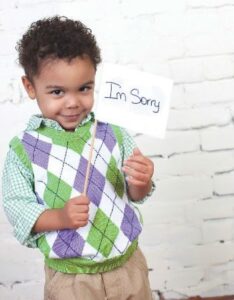
Teaching Children To Say I’m Sorry
“Go to your room and think about what you just said!” A phrase every child has heard at least once after being involved in a disagreement. “What should I think about?” asks nine-year-old Lisa. “I only called him what he is! It’s not like I did something wrong.”
Differences in opinion and accidentally hurt feelings are a part of life. Whether siblings hurt each other’s feelings arguing about whose turn it is to sit in the front seat, or your child fights with a pal over who built the best model car, forgiveness is a valuable lesson to learn.
When your children are involved in a situation requiring an apology, how do they demonstrate forgiveness? Does your child freely display sorrow or does he struggle to find an outlet to express his feelings?
“They each blurt out a half-hearted ‘I’m sorry’ just to avoid being punished,” confesses Lisa’s mother Diana. “If I didn’t tell them to apologize, I don’t think they would on their own,” she adds.
Many parents echo Diana’s sentiment of frustration. The mom of three boys, Beth Taffle finds her children’s lack of remorse more upsetting than their arguing. “I support their right to have unique opinions,” she said.
There are many options to teach your children how to say sorry and to show their forgiving nature. Whether apologizing for an intentional mistake or an accidentally hurt feeling, demonstrating forgiveness is important in relationships.
Recognition and responsibility
It is hard to apologize if a child doesn’t recognize he hurt someone’s feelings. He can correct an accidental mistake of forgetting to take out the trash with a simple but sincere “I’m sorry.” Intentionally saying something hurtful—even if it’s in the heat of an argument—might require a combination of apologetic actions. Help him to determine how the disagreement occurred and the disagreement’s direct result.
Show feelings instead of speaking them
Body language is a clear indicator of a person’s remorse. Replace standing up, arms defensively folded with a neutral environment to sit down comfortably together. Teach him that a smile shows sorrow as well as forgiveness. When he apologizes to you for forgetting to complete his household chores, expressing a smile sets a forgiving tone and teaches children how to accept an apology graciously.
Teach him to be patient when accepting an apology. Appearing to be in a hurry or not paying full attention puts the person apologizing in a defensive frame of mind. It’s not always easy to admit to a personal flaw or fault. Patiently accepting a sibling’s apology creates a forgiving environment. A quick and curt, “Sorry, now can I play with that?” doesn’t convey he’s truly apologetic to his friend or sibling for being unkind.
Teach him how to be sincere
A genuine apology indicates a child knows he has made a mistake. “I’m sorry that I called you that,” takes ownership for his role in the other person’s feelings. “Sorry your feelings were hurt” implies only partial responsibility for the situation. When accepting an apology, children should avoid saying, “I told you not to do that,” or analyzing the apology. Encourage your children to accept apologies unconditionally without offering qualifiers or looking for hidden meanings.
Set an example
Say, “I’m sorry” when you’re wrong. Children share two common perceptions concerning their parents. They believe their parents are perfect or that their parents never admit when they are wrong. Take the first step and apologize to him if you’ve hurt his feelings or made a mistake. He will respect that you are capable of not only making a mistake but also practicing the lessons you instill in him.
Think before you speak and act
A child’s immaturity leads to rash decisions. “You’re not my friend anymore,” or “I’m never speaking to you again,” usually follows an unpleasant exchange between children. Verbally severing a relationship frequently occurs in childhood scuffles. Encourage him to invite a friend who has been unkind over to play to rebuild the friendship. Suggest that friends share a movie, toss a ball in the park or work a puzzle together after a disagreement. Teach him that his feelings are justified and although he’s upset with someone, he doesn’t have to eliminate the person from his life.
Actions really do speak louder than words
After a disagreement read a story about forgiveness together. If the children involved need a change of scenery to break the ice and reconcile, suggest they take a walk together. If he is trying to forgive a friend or sibling, arrange an opportunity for them to share a common interest to begin the forgiveness process.
Use the time to talk about each of your feelings concerning the disagreement. After experiencing a quarrel with your child, ask him to sit quietly with you to admire the stars, notice the shapes in the clouds or listen to music or the rain to help calm them.
Demonstrate forgiveness with kind gestures
Baking ‘forgiveness cupcakes’ with a red heart in the center for the younger sibling he routinely and rudely dismisses shows, “I’m sorry.”
When he forgives his little brother for breaking his prized model airplane, suggest they do their household chores together to strengthen their bond. After the two of you have reconciled, asking for his help with the lawn shows that despite a disagreement, your love is unwavering.
Honest communication is essential
After a disagreement, hold a meeting to air your feelings. When siblings or friends argue, have them sit down together to openly and kindly express their points of view. Encourage them to ‘agree to disagree’ while accepting each other’s apology and respecting each other’s point of view.
Tomorrow is another day
Take the phone off the hook, turn off the television and give the involved parties the chance to share in an “it’s a brand new day” picnic or special dessert to celebrate forgiveness. Use the time to talk about how your children can solve sibling rivalry in a more productive and less hurtful manner. Feuding friends can serve each other lunch to show they’ve forgiven each other and moved on to a new day in their friendship.
It is important to instill the understanding that everyone makes a mistake or a bad decision. However, it is of notable consequence how we react to correct an error in judgment. By giving him the tools to apologize as well as forgive, you will help him be a compassionate and thoughtful child.





